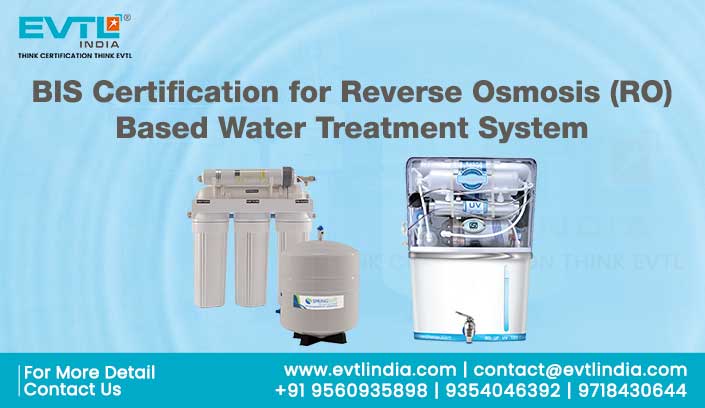BIS Certification For Reverse Osmosis (RO) With Evtl India Certificate Consultants
The market for RO technology-based water treatment has been entered by numerous organised and unorganised industries. This development emphasises how important it is to create a standard for RO-based water treatment systems. Taking this into account, BIS created IS 16240: 2015 for Reverse Osmosis (RO) based Point of Use (PoU) Water Treatment Systems.
To obtain BIS certification and create a high-quality product, the manufacturer must ensure that their product meets with the Indian standard. Without a product of regulated quality and certification, it is difficult to survive in this cutthroat industry. To create market dependence on their products, industries must produce a product of a certain quality standard. To use the standard ISI Mark and sell items in India, you also need a BIS license.
Let's examine IS 16240:2015 for Point-of-Use (PoU) Reverse Osmosis Water Treatment System in more detail.
This standard is applicable to Point-of-Use (POU) Reverse Osmosis (RO) based water treatment systems with a capacity of up to 25 litres per hour that reduce water TDS, reduce chemical contamination to safe levels, and remove physical particles, including microbiological pollutants. The standard excludes media and other consumables like filters.
The RO system's design and construction must adhere to the requirements stated in the standard. Their inlet port needs to be constructed so that it may be linked to the tap. The units must be able to be fitted beneath the sink, mounted to the wall and placed on a counter. Materials in contact with water must not impart extractable contaminants that exceed the permissible threshold for different plastic materials when tested in accordance with IS 9845.
Surfaces of RO system components must be made of corrosion-resistant materials, or they must have a corrosion-resistant treatment or coating of food-grade quality if they are anticipated to be wetted by water from the RO system. After the booster pump, all fittings must be pressure-resistant to the manufacturer's recommended maximum pressure.The RO system must be built and designed to serve its intended purpose when installed and used in accordance with the manufacturer's instructions.
In Accordance With The Procedure Outlined in The Standard, The Following Key Tests Must Be Carried Out:
- Reject Water Control Mechanism:
This test evaluates the mechanism that controls the discharge or rejection of water during the water treatment process. It ensures that the system properly manages and handles water that does not meet the required quality standards.
- TDS Reduction (Total Dissolved Solids Reduction):
TDS reduction test measures the efficiency of the water treatment system in reducing the concentration of total dissolved solids in the water. It is essential to ensure that the treated water meets the required TDS limits.
- Percent Recovery of Product Water:
This test determines the percentage of treated water that can be recovered from the overall water input to the system. It indicates the system's efficiency in producing usable water from the feedwater source.
- Hourly Production Rate:
The hourly production rate test measures the quantity of treated water that the system can produce within an hour. It is crucial to determine if the system meets the required capacity and can handle the projected demand.
- Leakage Current Test:
The leakage current test is likely related to electrical safety. It checks for any unintended electrical currents that might be present in the water treatment system, ensuring it meets safety standards.
- High Voltage Test:
This test assesses the system's ability to handle high voltage safely. It ensures that the electrical components within the system are properly insulated and do not pose any safety risks.
- Type Pressure Test (Hydrostatic Test):
The type of pressure test, also known as the hydrostatic test, evaluates the strength and integrity of the system's pressure vessels or containers by subjecting them to high-pressure conditions to identify potential leaks or weaknesses.
- Routine Pressure Test (Pneumatic Test):
The routine pressure test, also known as the pneumatic test, checks the system's components, pipelines, or connections for any leaks or weaknesses using pneumatic pressure.
- Chemical Reduction (Copper, Iron, Nitrate):
This test examines the system's ability to reduce the concentration of specific chemicals like copper, iron, and nitrate to meet the required water quality standards.
Marking Of Reverse Osmosis (RO)
You can contact us via email at contact@evtlindia.com or by phone at 9560935898. Feel free to get in touch with us anytime for the support you need.
EVTL India Services
Registration Consultant || CRS Certification | ISI Domestic Manufacture | ISI Foreign Manufacture | WMI Registration | ISI Mark Registration | EPR Registration for Plastic Packaging | EPR Registration for Electronic Waste Management | EPR For Re Ryclers | EPR Registration for Battery Waste Management | MOEF License | EPR Certificate | EPR Registration For Tyre Waste Certificate | EMI EMC Test | RF Testing | IP Rating Test | TEC Approvals | NABL Testing | LM-79 And LM-80 | ROHS Approval | CE Certification | TradeMark | Copy Right | CDCO Approvals | Drag License | WPC Certificate | BEE Registration | Fssai Registration | GEM Registration | TSDF Facility | Import Export License | Lab Setup And Lab Equipment | NOC For Steel | Legal Metrology | Make In India Mark | Certificate Consultant | ISI Certification |





